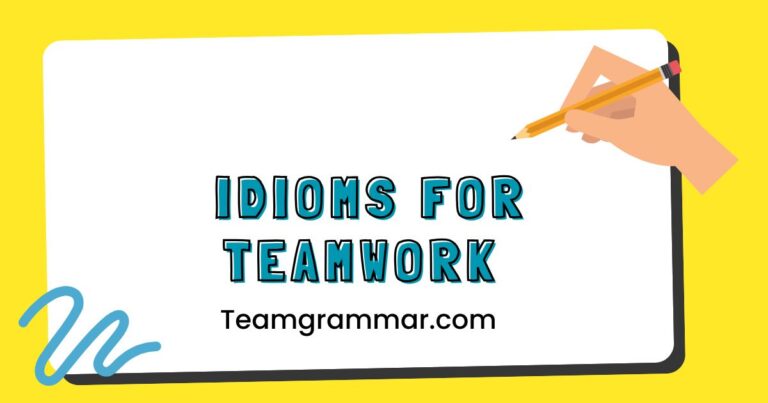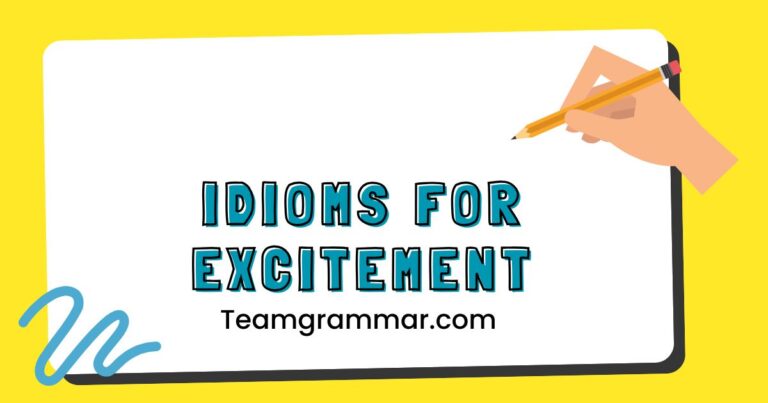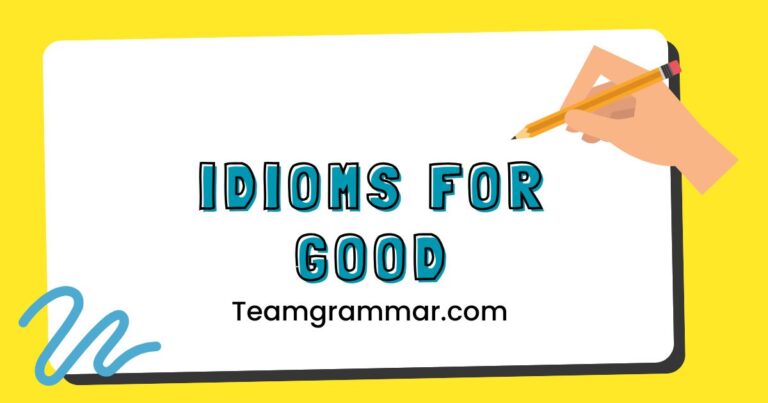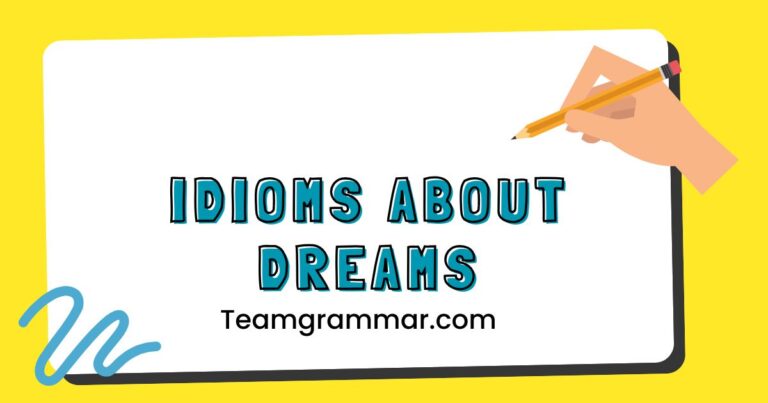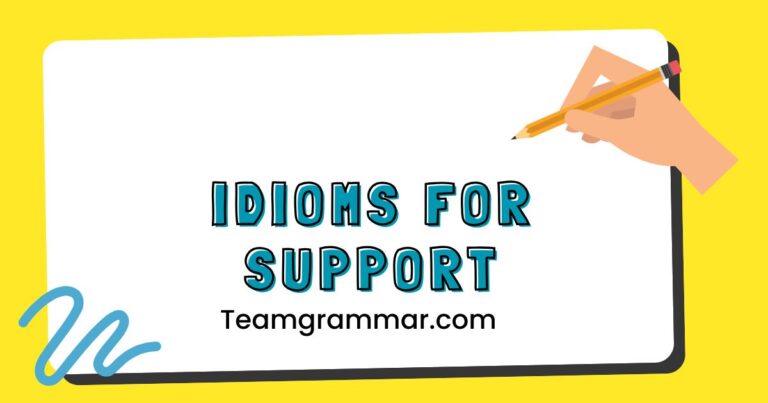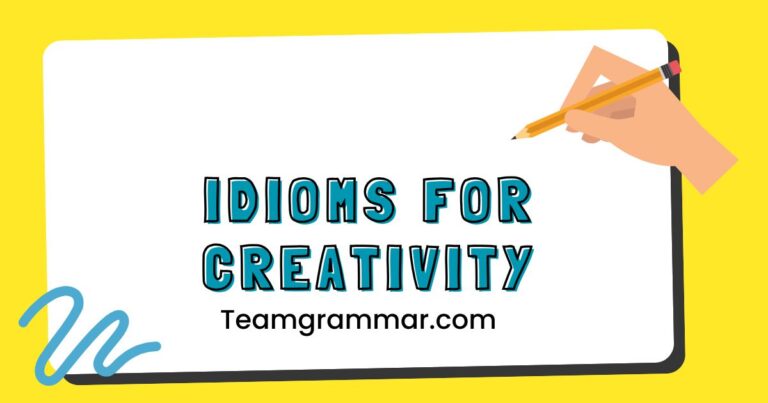39 Idioms About Good Luck: Mastering Common English Expressions
Understanding idioms enhances your grasp of the English language and allows you to communicate more naturally and effectively. Idioms about good luck are particularly useful in everyday conversations, adding color and depth to your expressions.
This article explores various idioms related to good fortune, their meanings, origins, and how to use them correctly. Whether you’re an English language learner or a native speaker looking to refine your vocabulary, this guide will help you master these common expressions and use them with confidence.
Table of Contents
- Introduction
- Definition of Idioms About Good Luck
- Structural Breakdown of Idioms
- Types and Categories of Good Luck Idioms
- Examples of Idioms About Good Luck
- Usage Rules for Good Luck Idioms
- Common Mistakes with Good Luck Idioms
- Practice Exercises
- Advanced Topics: Nuances and Variations
- Frequently Asked Questions
- Conclusion
Definition of Idioms About Good Luck
Idioms are expressions whose meanings cannot be understood from the literal meanings of the individual words. Instead, an idiom has a figurative meaning that is collectively understood within a language or culture.
Idioms about good luck are phrases that describe fortunate events, positive outcomes, or situations where someone experiences unexpected success. These idioms often carry cultural significance and reflect beliefs about luck, fortune, and destiny.
These idioms are not just figures of speech; they are cultural markers that enrich communication. Using them correctly demonstrates a strong command of the English language and an understanding of the cultural context in which they are used.
They add color and depth to conversations, making them more engaging and relatable.
Classification of Idioms
Idioms can be classified based on their structure and function. Some are metaphorical, using comparisons to convey meaning, while others are based on historical events or cultural practices.
Idioms about good luck often fall into the metaphorical category, drawing on images of fortune, chance, and success.
Function of Idioms
The primary function of idioms is to add expressiveness and nuance to language. They allow speakers and writers to convey complex ideas and emotions in a concise and memorable way.
Idioms about good luck specifically serve to highlight positive outcomes and express optimism or congratulations.
Contexts of Use
Idioms about good luck are used in a variety of contexts, from casual conversations to formal speeches. They can be used to celebrate achievements, offer encouragement, or simply acknowledge a stroke of good fortune.
The specific idiom used will often depend on the situation and the relationship between the speakers.
Structural Breakdown of Idioms
Idioms are typically fixed expressions, meaning their structure cannot be altered without changing their meaning or rendering them nonsensical. Understanding the structure of idioms involves recognizing the individual words and their arrangement, as well as the overall figurative meaning.
Many idioms follow specific grammatical patterns, such as verb phrases, prepositional phrases, or clauses. Recognizing these patterns can help learners identify and understand new idioms more easily.
However, it’s essential to remember that the meaning of an idiom is not derived from its grammatical structure but rather from its established usage.
Common Idiomatic Patterns
Several common patterns appear in idioms about good luck. These include:
- Verb + Preposition: Fall into luck, stumble upon fortune
- Noun + Verb: Opportunity knocks, stars align
- Adjective + Noun: Lucky break, charmed life
These patterns can provide a framework for understanding and remembering idioms, but it’s crucial to learn the specific meaning of each idiom individually.
Rules and Variations
While idioms are generally fixed expressions, some may have slight variations depending on the context or regional dialect. These variations usually involve minor changes in wording or phrasing, but the core meaning remains the same.
For example, “break a leg” might sometimes be expressed as “go break a leg,” but the intended meaning of wishing someone good luck remains consistent.
Types and Categories of Good Luck Idioms
Idioms about good luck can be categorized based on the specific aspect of fortune they describe. This includes idioms that refer to unexpected luck, those that describe a consistently fortunate person, and those used to wish someone good luck.
Idioms Describing Unexpected Luck
These idioms refer to situations where someone experiences good fortune that was not anticipated or earned. They often highlight the element of chance or serendipity.
Idioms Describing a Fortunate Person
These idioms describe individuals who consistently experience good luck or who seem to be blessed with good fortune throughout their lives.
Idioms for Wishing Luck
These idioms are used to express good wishes or to offer encouragement to someone who is about to undertake a challenging task or face an uncertain situation.
Examples of Idioms About Good Luck
This section provides extensive examples of idioms about good luck, organized by category. Each example is accompanied by a definition and a sample sentence to illustrate its usage.
Examples of Idioms Describing Unexpected Luck
The following table provides examples of idioms that describe unexpected luck. Each idiom is defined and used in a sentence to illustrate its meaning.
Understanding these idioms will enhance your ability to recognize and use them in appropriate contexts.
| Idiom | Definition | Example Sentence |
|---|---|---|
| A stroke of luck | A sudden and unexpected piece of good fortune. | Finding that lost wallet was a real stroke of luck. |
| Fall into luck | To experience good fortune unexpectedly. | He fell into luck when he won the lottery. |
| Beginner’s luck | Success experienced by a novice in a new activity. | I won my first game of poker, but it was just beginner’s luck. |
| Lucky break | A fortunate opportunity or event. | Getting that job was a lucky break for her career. |
| Hit the jackpot | To achieve a major success or win a large prize. | They hit the jackpot when their invention became a bestseller. |
| In the right place at the right time | Being present when and where a fortunate event occurs. | He was in the right place at the right time to receive the promotion. |
| Stumble upon fortune | To find good luck unexpectedly. | She stumbled upon fortune when she discovered the ancient artifact. |
| Come up roses | To end successfully despite initial difficulties. | Despite the challenges, the project came up roses in the end. |
| Find a pot of gold at the end of the rainbow | To achieve a great success or find a treasure. | He felt like he found a pot of gold at the end of the rainbow when his business took off. |
| Win the lottery | To experience a significant and unexpected success. | She felt like she had won the lottery when she got accepted into her dream university. |
| Have a golden touch | To have the ability to succeed in everything one does. | Everything he invests in turns to gold; he really has a golden touch. |
| Chance upon something good | To find or discover something positive unexpectedly. | I chanced upon something good when I found a rare book at the flea market. |
| Land on one’s feet | To recover quickly from a difficult situation and succeed. | Despite losing his job, he managed to land on his feet by starting his own business. |
| Strike gold | To discover something valuable or profitable unexpectedly. | The company struck gold when they developed the new software. |
| Be born under a lucky star | To be born with good fortune. | She must have been born under a lucky star to have achieved so much at such a young age. |
| Find a four-leaf clover | To experience a rare and fortunate occurrence. | It felt like she had found a four-leaf clover when she secured the deal. |
| Have all the luck | To experience an unusually high degree of good fortune. | He seems to have all the luck, always winning contests and getting promotions. |
| Luck out | To be very lucky. | We really lucked out when we found such an affordable apartment in the city center. |
| Walk into good fortune | To encounter good luck without effort. | She practically walked into good fortune by meeting the right people at the conference. |
| Get a lucky break | To receive an unforeseen opportunity or advantage. | He got a lucky break when the lead actor fell ill, and he was chosen to replace him. |
Examples of Idioms Describing a Fortunate Person
The following table presents idioms used to describe someone who is consistently fortunate. These idioms often imply that the person’s success is due to luck rather than skill or effort.
| Idiom | Definition | Example Sentence |
|---|---|---|
| Born with a silver spoon in their mouth | Born into a wealthy and privileged family. | He was born with a silver spoon in his mouth and never had to worry about money. |
| A charmed life | A life that seems to be protected by good luck. | She leads a charmed life, always escaping danger and finding success. |
| Lucky dog | Someone who is very fortunate. | He’s such a lucky dog; he always gets the best opportunities. |
| Living the life of Riley | Enjoying a comfortable and luxurious lifestyle. | Since he retired, he’s been living the life of Riley, traveling and relaxing. |
| Riding one’s luck | To continue to take advantage of a period of good fortune. | He’s been riding his luck since he won the lottery, making risky investments. |
| In the lap of luxury | Living in very comfortable and wealthy conditions. | They are in the lap of luxury, with servants and a mansion. |
| Sitting pretty | In a favorable or advantageous position. | After the successful launch of their product, they are sitting pretty. |
| Made of money | Extremely wealthy. | They seem to be made of money, always buying expensive things. |
| To have it made | To achieve financial security and comfort. | Once he finished his degree and got a good job, he had it made. |
| Fortune smiles upon someone | To be favored by luck or good fortune. | Fortune smiles upon her, as she always seems to succeed in her endeavors. |
| To lead a golden life | To live a life filled with happiness and prosperity. | She seems to lead a golden life, surrounded by love and success. |
| To have a knack for success | To have a natural talent or ability to achieve success. | He has a knack for success, always finding ways to make his projects thrive. |
| Blessed with good fortune | To be consistently lucky or fortunate. | They are blessed with good fortune, always encountering positive opportunities. |
| To be born lucky | To have innate good luck from birth. | She seems to be born lucky, always finding herself in advantageous situations. |
| To walk on water | To be seen as infallible or always successful. | In his company, he can do no wrong; he practically walks on water. |
| To have the Midas touch | To have the ability to turn everything into gold or success. | Every business he starts becomes successful; he truly has the Midas touch. |
| To be a golden child | To be a favored or successful person. | In their family, he is the golden child, always praised for his achievements. |
| To have the wind at one’s back | To have favorable conditions or circumstances supporting one’s efforts. | With the new policy changes, the company has the wind at its back for growth. |
| To sail through life | To live a life without significant difficulties or challenges. | She seems to sail through life, effortlessly achieving her goals. |
| To be on a winning streak | To experience a continuous series of successes. | The team is on a winning streak, having won their last ten games. |
Examples of Idioms for Wishing Luck
The following table provides idioms used to wish someone good luck. These idioms are often used before a performance, a competition, or any situation where the outcome is uncertain.
| Idiom | Definition | Example Sentence |
|---|---|---|
| Break a leg | A theatrical expression to wish someone good luck, especially before a performance. | “Break a leg!” I shouted as she walked onto the stage. |
| Knock ’em dead | To impress or overwhelm an audience or competitor. | “Go out there and knock ’em dead!” the coach told the team. |
| Best of luck | A general expression of good wishes. | “Best of luck with your interview tomorrow!” |
| Fingers crossed | A gesture of hoping for good luck. | I’m keeping my fingers crossed that I get the job. |
| Godspeed | An expression of good wishes for a successful journey or endeavor. | “Godspeed on your new adventure!” |
| All the best | Wishing someone well in their future endeavors. | “All the best in your new job!” |
| Wish someone well | To express good wishes for someone’s success or happiness. | I wish you well in all your future endeavors. |
| More power to you | An expression of encouragement and support. | You’re taking on a big challenge; more power to you! |
| Hope for the best | To maintain a positive outlook despite uncertainty. | We can only hope for the best in this situation. |
| May the force be with you | An expression of encouragement and good luck, often used humorously. | “You have a big presentation tomorrow; may the force be with you!” |
| Keep your chin up | To remain positive and hopeful in a difficult situation. | Even though things are tough, try to keep your chin up. |
| To come up trumps | To succeed despite difficulties. | I’m sure he’ll come up trumps in the end, he always does. |
| To be in good hands | To be under the care or protection of someone capable. | Don’t worry about the project; it’s in good hands with her. |
| To be on the right track | To be proceeding in a way that is likely to be successful. | The team is on the right track with their new strategy. |
| To have a good run | To experience a period of success or good fortune. | They’ve had a good run in the market, with increasing sales. |
| To go far | To achieve great success in the future. | With her talent and dedication, she’s sure to go far in her career. |
| To make it big | To achieve great success or fame. | He dreams of becoming a famous actor and making it big in Hollywood. |
| To reach for the stars | To aim for ambitious goals. | No matter how difficult it seems, always reach for the stars. |
| To see one through | To provide support or help until the end of a difficult situation. | I hope this money will see us through until we find new jobs. |
| To turn out well | To have a positive outcome. | Despite the initial challenges, I hope everything will turn out well. |
Usage Rules for Good Luck Idioms
Using idioms correctly requires an understanding of their specific meanings and the contexts in which they are appropriate. Idioms about good luck are generally used in informal settings, but some may be suitable for more formal occasions.
It’s important to consider your audience and the tone of your communication when choosing an idiom.
One of the key rules for using idioms is to avoid mixing them. Combining parts of different idioms can create nonsensical or humorous expressions, but it can also confuse your audience.
Stick to the complete and established form of each idiom to ensure clarity.
Contextual Appropriateness
Consider the setting and audience when using idioms. Some idioms are more casual and appropriate for conversations with friends and family, while others are more formal and suitable for professional settings.
For example, “break a leg” is a common expression in the theater world but may not be appropriate in a business meeting.
Avoiding Idiom Mixing
Mixing idioms can lead to confusion and miscommunication. Always use the complete and correct form of an idiom.
For example, instead of saying “hit the nail on the head of the iceberg,” use either “hit the nail on the head” or “tip of the iceberg.”
Grammatical Consistency
While idioms are fixed expressions, it’s important to maintain grammatical consistency within the sentence. Ensure that the idiom fits grammatically with the surrounding words and phrases.
For example, use the correct verb tense and subject-verb agreement.
Common Mistakes with Good Luck Idioms
One of the most common mistakes with idioms is taking them literally. Because idioms have figurative meanings, interpreting them literally can lead to misunderstandings.
Another common mistake is using idioms in inappropriate contexts. Using a casual idiom in a formal setting can sound unprofessional, while using a formal idiom in a casual conversation can sound stilted.
Another frequent error is altering the wording of an idiom. Idioms are fixed expressions, and changing the words can alter the meaning or make the idiom nonsensical.
Always use the correct and established form of the idiom.
| Incorrect | Correct | Explanation |
|---|---|---|
| Break your leg! | Break a leg! | The correct idiom is “break a leg,” not “break your leg.” |
| I wish you more good! | I wish you well! | The idiom is “wish someone well,” not “wish someone more good.” |
| He was born with a gold spoon. | He was born with a silver spoon in his mouth. | The correct idiom is “born with a silver spoon in his mouth,” referring to wealth and privilege. |
| They hit the bucket! | They hit the jackpot! | The correct idiom is “hit the jackpot,” meaning to achieve great success. |
| Keep your head up! | Keep your chin up! | The correct idiom is “keep your chin up,” meaning to stay positive. |
| All the bestest! | All the best! | The idiom is “all the best,” not “all the bestest.” |
| Chance of luck! | Stroke of luck! | The correct idiom is “stroke of luck,” meaning a sudden piece of good fortune. |
| Fingers cross! | Fingers crossed! | The idiom is “fingers crossed,” not “fingers cross.” |
| He leads a charmed life’s. | He leads a charmed life. | The correct idiom is “a charmed life”. |
| Beginner’s lucky. | Beginner’s luck. | The correct idiom is “beginner’s luck”. |
Practice Exercises
These exercises will help reinforce your understanding of idioms about good luck. Choose the correct idiom to complete each sentence.
- After months of searching, she finally got a job. It was a real __________.
- a) lucky charm
- b) lucky break
- c) lucky strike
Answer: b) lucky break
- He __________ when he invested in that company early on.
- a) hit the bucket
- b) hit the jackpot
- c) hit the road
Answer: b) hit the jackpot
- She seems to have a __________, always finding success in whatever she does.
- a) charmed life
- b) charming life
- c) charm life
Answer: a) charmed life
- I’m keeping my __________ that I get accepted into my dream university.
- a) toes crossed
- b) legs crossed
- c) fingers crossed
Answer: c) fingers crossed
- __________ with your performance tonight!
- a) Leg break
- b) Break a leg
- c) Break your leg
Answer: b) Break a leg
- He was __________ and never had to worry about finances.
- a) born with a gold spoon
- b) born with a silver spoon in his mouth
- c) born with a platinum spoon
Answer: b) born with a silver spoon in his mouth
- After all the difficulties, the project finally __________.
- a) came up daisies
- b) came up tulips
- c) came up roses
Answer: c) came up roses
- He just happened to be __________ when the opportunity arose.
- a) in the right place at the right time
- b) in the wrong place at the wrong time
- c) in no place at no time
Answer: a) in the right place at the right time
- She __________ when she found an antique necklace at a garage sale.
- a) tripped upon fortune
- b) stumbled upon fortune
- c) walked upon fortune
Answer: b) stumbled upon fortune
- I __________ that you get the promotion.
- a) wish you bad
- b) wish you good
- c) wish you well
Answer: c) wish you well
Advanced Topics: Nuances and Variations
For advanced learners, understanding the nuances and variations of idioms is crucial. This involves recognizing the subtle differences in meaning between similar idioms, as well as understanding how idioms can be adapted or modified for specific purposes.
Additionally, exploring the cultural and historical origins of idioms can provide deeper insights into their meanings and usage. Many idioms have roots in historical events, literature, or cultural practices, and understanding these origins can enhance your appreciation of the language.
Exploring Cultural Origins
Many idioms are rooted in cultural or historical contexts. Understanding these origins can provide deeper insights into the meaning and usage of the idiom.
For example, the idiom “break a leg” is believed to have originated in the theater, where saying “good luck” was considered bad luck.
Regional Variations
Idioms can vary by region or dialect. Some idioms may be more common in certain parts of the world or among specific groups of people.
Being aware of these regional variations can help you avoid misunderstandings and communicate more effectively.
Frequently Asked Questions
- What is an idiom?
An idiom is a phrase or expression whose meaning cannot be understood from the literal meanings of the individual words. Instead, it has a figurative meaning that is collectively understood within a language or culture.
- Why are idioms important to learn?
Learning idioms enhances your understanding of the English language and allows you to communicate more naturally and effectively. Idioms add color and depth to your expressions, making your conversations more engaging and relatable.
- How can I learn new idioms?
One of the best ways to learn new idioms is through exposure. Read books, watch movies, and listen to conversations in English. Pay attention to the phrases that are used and try to understand their meanings in context. You can also use online resources and idiom dictionaries to expand your vocabulary.
- Can I change the words in an idiom?
No, idioms are generally fixed expressions, meaning their structure cannot be altered without changing their meaning or rendering them nonsensical. Always use the complete and established form of the idiom.
- Are idioms used in formal writing?
While idioms are more common in informal settings, some may be appropriate for formal writing depending on the context and tone. Consider your audience and the purpose of your writing when choosing whether to use an idiom.
- What should I do if I don’t understand an idiom?
If you encounter an idiom you don’t understand, try to infer its meaning from the context. If that’s not possible, look it up in an idiom dictionary or ask a native speaker for clarification.
- How can I practice using idioms?
Practice using idioms in your own speaking and writing. Try incorporating them into your conversations and written assignments. The more you use them, the more comfortable you will become with their meanings and usage.
- Why do idioms have figurative meanings?
Idioms have figurative meanings because they evolved over time through cultural and historical usage. The literal meanings of the words may have been relevant at one point, but the figurative meaning has become the accepted interpretation.
- Are idioms the same in all English-speaking countries?
No, idioms can vary by region or dialect. Some idioms may be more common in certain parts of the world or among specific groups of people. Being aware of these regional variations can help you avoid misunderstandings.
- Can I create my own idioms?
While it’s possible to create new phrases or expressions, they won’t become idioms unless they are widely adopted and understood by a community of speakers. Idioms typically evolve over time through collective usage and cultural acceptance.
- How do idioms reflect culture?
Idioms often reflect cultural values, beliefs, and historical experiences. They can provide insights into the way people in a particular culture think and communicate. Understanding the cultural origins of idioms can enhance your appreciation of the language and its speakers.
- What’s the difference between an idiom and a metaphor?
Both idioms and metaphors use figurative language, but they differ in their structure and usage. A metaphor is a direct comparison between two unlike things, while an idiom is a fixed expression with a non-literal meaning. Metaphors can be created spontaneously, while idioms are established phrases with a specific meaning.
Conclusion
Mastering idioms about good luck is an essential step in achieving fluency and confidence in English. These expressions not only enhance your vocabulary but also provide valuable insights into the cultural nuances of the language.
By understanding the definitions, usage rules, and common mistakes associated with these idioms, you can communicate more effectively and expressively.
Continue to practice using idioms in your everyday conversations and written communication. Pay attention to how native speakers use them and try to incorporate them into your own language.
With consistent effort and attention, you will gradually expand your repertoire of idioms and become more proficient in English.


